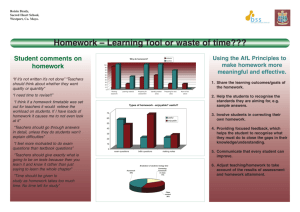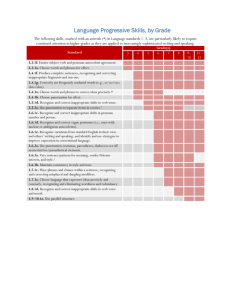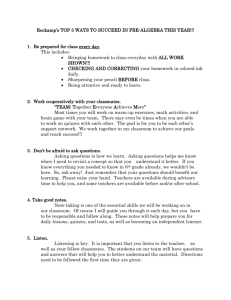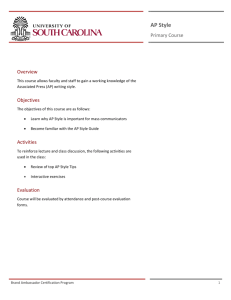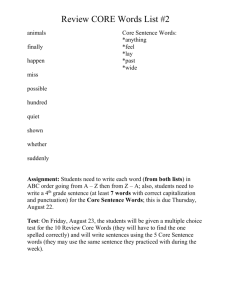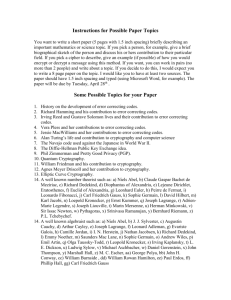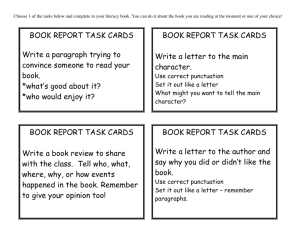Syllabus form - Rose State College
advertisement
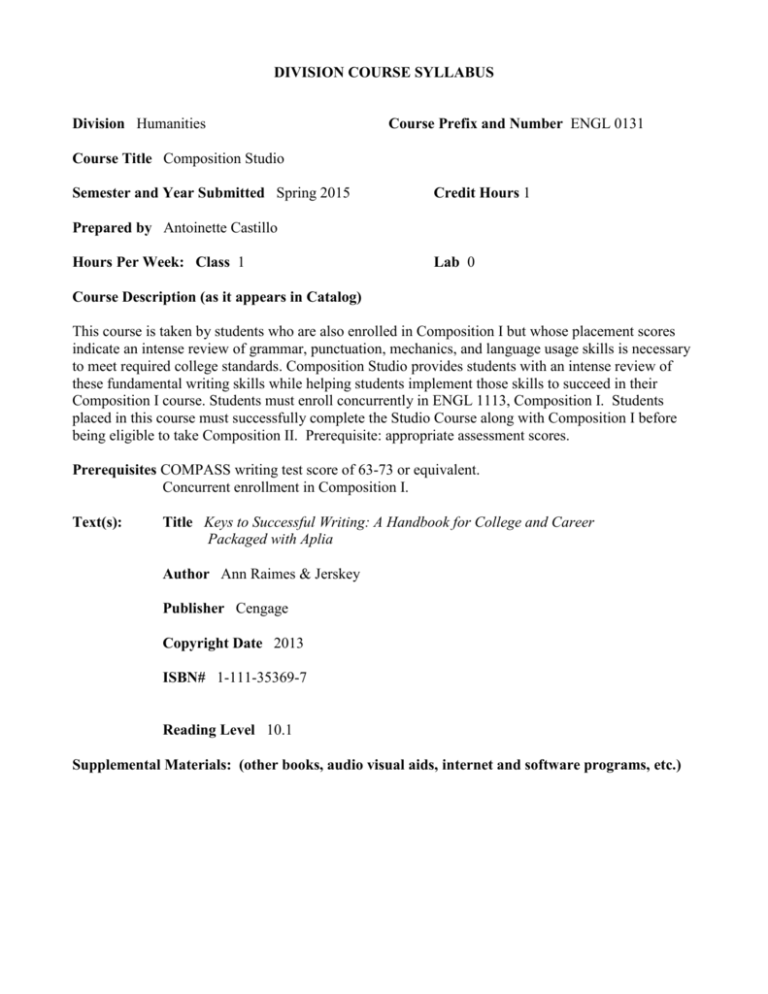
DIVISION COURSE SYLLABUS Division Humanities Course Prefix and Number ENGL 0131 Course Title Composition Studio Semester and Year Submitted Spring 2015 Credit Hours 1 Prepared by Antoinette Castillo Hours Per Week: Class 1 Lab 0 Course Description (as it appears in Catalog) This course is taken by students who are also enrolled in Composition I but whose placement scores indicate an intense review of grammar, punctuation, mechanics, and language usage skills is necessary to meet required college standards. Composition Studio provides students with an intense review of these fundamental writing skills while helping students implement those skills to succeed in their Composition I course. Students must enroll concurrently in ENGL 1113, Composition I. Students placed in this course must successfully complete the Studio Course along with Composition I before being eligible to take Composition II. Prerequisite: appropriate assessment scores. Prerequisites COMPASS writing test score of 63-73 or equivalent. Concurrent enrollment in Composition I. Text(s): Title Keys to Successful Writing: A Handbook for College and Career Packaged with Aplia Author Ann Raimes & Jerskey Publisher Cengage Copyright Date 2013 ISBN# 1-111-35369-7 Reading Level 10.1 Supplemental Materials: (other books, audio visual aids, internet and software programs, etc.) Rationale: Since Rose State is an open admission higher learning institution, students who begin college here may possess the writing and critical thinking skills necessary for Composition I, but may not have the necessary skills in using grammar, punctuation, language, and mechanics required for the course. Composition Studio provides assistance in improving those technical skills while students are concurrently taking Composition I. Expected Outcomes (Course Objectives): 1. Students will demonstrate the ability to identify common sentence problems and correct them in their own compositions. 2. Students will demonstrate the ability to identify common grammar problems and correct them in their own compositions. 3. Students will demonstrate the ability to identify common punctuation problems and correct them in their own compositions. 4. Students will demonstrate the ability to identify common mechanics problems and correct them in their own compositions. Methods of Instruction: This is a studio course, so time devoted to lecture should be brief. Students should spend the majority of class time applying the skills being learned to their own writing for the concurrent Composition I courses in which they are enrolled. The professor in the Studio Course should provide extensive feedback on how effectively those technical skills are being implemented in the assignments for Composition I. Students enrolled in traditional sections will complete extensive work outside of class meetings using online resources available in the class's online learning platform. Online sections of the course will provide similar emphasis in learning skills using online resources, and then applying those skills in students' own writing for the concurrent Composition I courses in which they are enrolled. As in traditional sections, the professor in the Studio Course will provide extensive feedback on how effectively those technical skills are being implemented in the assignments for Composition I. Assessment (Including Critical Thinking Measurements): 25% Online/Computer exercises (including initial assessment) 50% Practice applying skills in Composition I writing assignments 25% Final Exam Learning Objectives: Unit 1 – Initial Assessment Complete initial assessment for student placement and semester planning. (The initial assessment will assess grammar, punctuation, spelling, mechanics, and language usage in order to refer students who need more intensive review in these areas to the Tutoring Center, Writing Center, or ESL Workshops to meet the needed skill level. Students may also be advised to re-take the COMPASS Test to ensure accuracy of placement.) Unit 2 (Outcome 4) 1. Identify sentence errors in capitalization, end punctuation, and spelling--with emphasis on homonyms. 2. Use online/computer exercises to reinforce skills identifying and correcting errors in capitalization, end punctuation, and spelling--with emphasis on homonyms. 3. Practice correcting the student's own writing in Composition I for errors in capitalization, end punctuation, and spelling--with emphasis on homonyms. Unit 3 (Outcome 1) 1. Identify sentence fragment errors, run-ons, and comma splices. 2. Use online/computer exercises to reinforce skills identifying and correcting sentence fragment errors, run-ons, and comma splices. 3. Practice correcting the student's own writing in Composition I for sentence fragment errors, run-ons, and comma splices. Unit 4 (Outcome 3) 1. Identify and correct errors in usage of commas. 2. Use online/computer exercises to reinforce skills identifying and correcting errors in comma usage. 3. Practice correcting the student's own writing in Composition I for errors in usage of commas. Unit 5 (Outcome 3) 1. Identify and correct errors in usage of apostrophes. 2. Use online/computer exercises to reinforce skills identifying and correcting errors in apostrophe usage. 3. Practice correcting the student's own writing in Composition I for errors in usage of apostrophes. 4. Complete grade check with ENGL 1113 professor and forward to Studio Course professor. Unit 6 (Outcome 2) 1. Identify and correct errors in usage of subject-verb agreement, verb tense, voice, and common errors of verb confusion. 2. Use online/computer exercises to reinforce skills identifying and correcting errors in subjectverb agreement, voice, verb tense, and common errors of verb confusion. 3. Practice correcting the student's own writing in Composition I for errors in usage of subjectverb agreement, verb tense, voice, and common errors of verb confusion. Unit 7 (Outcome 2) 1. Identify and correct errors in usage of pronoun agreement, reference, shifts, and common errors of pronoun confusion. 2. Use online/computer exercises to reinforce skills identifying and correcting errors in usage of pronoun agreement, reference, shifts, and common errors of pronoun confusion. 3. Practice correcting the student's own writing in Composition I for errors in usage of pronoun agreement, reference, shifts, and common errors of pronoun confusion. Unit 8 (Outcomes 3 & 4) 1. Identify and correct errors in usage of parentheses, dashes, the colon, the semicolon, the hyphen, direct quotations, titles, capitalization, and abbreviations. 2. Use online/computer exercises to reinforce skills identifying and correcting errors in usage of parentheses, dashes, the colon, the semicolon, the hyphen, direct quotations, titles capitalization, and abbreviations. 3. Practice correcting the student's own writing in Composition I for errors in usage of usage of parentheses, dashes, the colon, the semicolon, the hyphen, direct quotations, titles, capitalization, and abbreviations. Unit 9 (Outcome 2) 1. Identify and correct errors in usage of adjectives, adverbs, and misplaced and dangling modifiers. 2. Recognize and revise errors in usage of adjectives, adverbs, and misplaced and dangling modifiers. 3. Practice correcting the student's own writing in Composition I errors in usage of adjectives, adverbs, and misplaced and dangling modifiers. Unit 10 (Outcomes 1 & 2) 1. Identify and correct errors in faulty parallelism and nonstandard language usage in sentences. 2. Recognize and revise errors in usage of parallelism and nonstandard language usage in sentences. 3. Practice correcting the student's own writing in Composition I errors in parallelism and nonstandard language usage. Unit 11 – Final Evaluation Complete the required Humanities Division final assessment in class during the last scheduled day of class. Note: When submitting final course grades, the professor will forward a list of students who did not pass the course successfully to the Writing Program Administrator.
